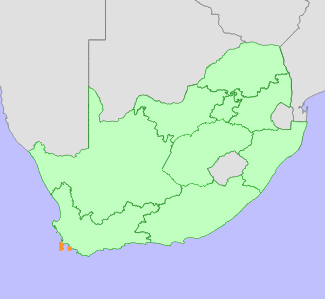|
Scientific Name | Erica brachialis Salisb. |
Higher Classification | Dicotyledons |
Family | ERICACEAE |
National Status |
Status and Criteria | Vulnerable B1ab(iii,v)+2ab(iii,v); C2a(i) |
Assessment Date | 2020/11/25 |
Assessor(s) | R.C. Turner, D.A. Kamundi & L. von Staden |
Justification | Erica brachialis is a range-restricted species, with an extent of occurrence (EOO) of 794 km². It occurs in small, scattered clumps. There are currently six known subpopulations, with the largest subpopulation consisting of around 480 mature individuals, and the total population size estimated to number less than 1200 mature individuals. This slow-growing reseeder is declining due to too frequent fire, competition from alien invasive plants and habitat loss to coastal development. It is therefore listed as Vulnerable under criteria B and C. |
Distribution |
Endemism | South African endemic |
Provincial distribution | Western Cape |
Range | This species is endemic to South Africa, and is found from Cape Peninsula and Rooiels to Hangklip. |
Habitat and Ecology |
Major system | Terrestrial |
Major habitats | Cape Flats Dune Strandveld, Peninsula Sandstone Fynbos, Kogelberg Sandstone Fynbos, Hangklip Sand Fynbos |
Description | It occupies rocky coastal outcrops and lower slopes of coastal mountains, on granitic and sandstone substrates, often just above the spray zone of ocean waves. |
Threats |
| Erica brachialis is threatened on the Cape Peninsula, particularly around Hout Bay and Kommetjie, by competition from alien invasive plants and too frequent fire. Subpopulations around Rooiels and Pringle Bay are threatened by ongoing habitat loss to coastal development. |
Population |
This species occurs as small, scattered and relatively isolated clumps of plants on the Cape Peninsula and between Rooiels and Pringle Bay. Currently six subpopulations are known, with subpopulation sizes varying between 35 and 480 plants. The population size is estimated to number fewer than 1200 mature individuals.
|
Population trend | Decreasing |
Assessment History |
Taxon assessed |
Status and Criteria |
Citation/Red List version | | Erica brachialis Salisb. | EN B1ab(ii,iii,iv,v); C2a(i) | 2012.1 | | Erica brachialis Salisb. | EN B1ab(ii,iii,iv,v); C2a(i) | Raimondo et al. (2009) | |
Bibliography |
Baker, H.A. and Oliver, E.G.H. 1967. Ericas in southern Africa. Purnell, Cape Town & Johannesburg.
Goldblatt, P. and Manning, J.C. 2000. Cape Plants: A conspectus of the Cape Flora of South Africa. Strelitzia 9. National Botanical Institute, Cape Town.
Oliver, E.G.H. and Oliver, I.M. 2005. The genus Erica (Ericaceae) in southern Africa: taxonomic notes 2. Bothalia 35(2):121-148.
Raimondo, D., von Staden, L., Foden, W., Victor, J.E., Helme, N.A., Turner, R.C., Kamundi, D.A. and Manyama, P.A. 2009. Red List of South African Plants. Strelitzia 25. South African National Biodiversity Institute, Pretoria.
Schumann, D., Kirsten, G. and Oliver, E.G.H. 1992. Ericas of South Africa. Fernwood Press, Cape Town.
|
Citation |
| Turner, R.C., Kamundi, D.A. & von Staden, L. 2020. Erica brachialis Salisb. National Assessment: Red List of South African Plants version 2024.1. Accessed on 2025/10/24 |
 Comment on this assessment
Comment on this assessment


